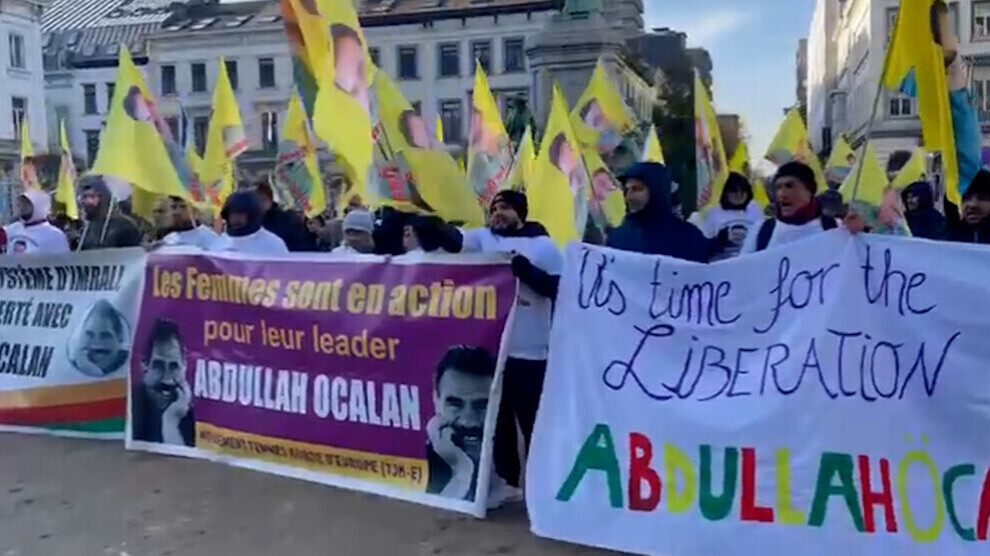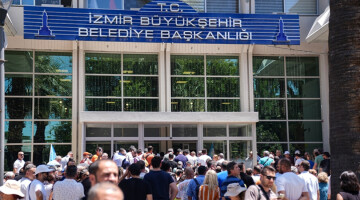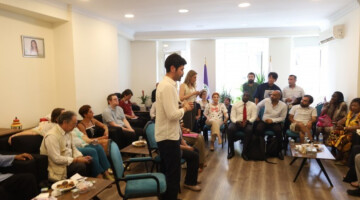The Kurdish Women's Movement in Europe (TJK-E) called for a demonstration in front of the European Parliament in Brussels to demand contact with Abdullah Öcalan after it recently became known that the Council of Europe's Committee for the Prevention of Torture (CPT) had not met with Öcalan during its latest inspection of detention centres in Turkey in September.
The demonstrators demanded clarification about the CPT's visit and information about the condition of the Kurdish leader, who has been imprisoned on the prison island of Imrali since 1999. Many participants carried flags with pictures of Abdullah Öcalan, as well as flags of the PKK (Kurdistan Workers’ Party).
Ayten Kaplan, in a speech on behalf of the TJK-E, spoke of the importance of Öcalan for the Kurdish people and a peaceful solution to the Kurdish question and criticized the inaction and silence of the European Parliament. In another statement, information was given about the total isolation imposed on the Imrali prisoners.
NO CONTACT WITH IMRALI PRISONERS
Abdullah Öcalan was abducted from Kenya to Turkey in an international coup on 15 February 1999 and has been isolated for years with his three fellow prisoners, Ömer Hayri Konar, Hamili Yıldırım and Veysi Aktaş. A strict ban on lawyers has been in force again on Imrali since 2019, and the last visit by Öcalan's defence team took place in August 2019. Konar, Yıldırım and Aktaş have never been able to exercise their right to legal representation since their transfer to the island prison in 2015.
CPT DELEGATION INSPECTS IMRALI
The Council of Europe's Committee for the Prevention of Torture (CPT) carried out an ad hoc visit to Turkey in September and issued a statement on 3 October. The statement said it reviewed the general treatment and detention conditions of Imrali prisoners with a focus on community activities and contacts with the outside world.
STATEMENT BY ASRIN LAW OFFICE
The Asrin Law Office in Istanbul, which legally represents Öcalan and his fellow prisoners, announced on 29 November that there was no contact with Öcalan at all during the CPT visit to Imrali. A personal conversation with representatives of the body then further increased concerns about the situation on the island, as even the slightest information about the conditions of the Imrali prisoners was denied.
KCK DEMANDS IMMEDIATE CLARIFICATION
The Kurdistan Communities Union (KCK) called on the CPT on 6 December to provide clarity on the situation of Abdullah Öcalan. In its statement, the KCK reiterated that lifting the isolation on Imrali could also unlock the channels for a solution to the Kurdish question and thus initiate a democratisation of Turkey.
LAST SIGN OF LIFE IN MARCH 2021
There was a last sign of life from Imrali in the form of a telephone conversation between Öcalan and his brother in March 2021, which broke off after a few minutes for unknown reasons. The Asrin Law Office does make regular requests for visits to see their clients. However, the Turkish authorities refuse or ignore these requests. The situation is similar with visitation requests from family members. As a legal cloak for injustice on the island in the Sea of Marmara, the Turkish judiciary usually uses arbitrary "disciplinary measures" imposed on Imrali prisoners. For a long time, the Turkish authorities even used the "Roadmap for Negotiations" submitted by Öcalan to the European Court of Human Rights (ECtHR) in 2009 as a justification for the ban on visiting the legal team.
OPEN VIOLATION OF THE LAW
The ban on lawyer visits in Imrali Prison openly violates the United Nations (UN) Standard Minimum Rules for the Treatment of Prisoners (Nelson Mandela Rules), updated in 2015, the recommendations of the Council of Europe's Committee for the Prevention of Torture and the Turkish Law on Execution (Law No. 5275). States are obliged to ensure the exercise of the rights of prisoners and convicts without regard to their identity or the quality of their punishment. Yet the Turkish judiciary is unwilling to correct the inhumane conditions of imprisonment on Imrali and continues to treat prisoners according to the law of the enemy.












